Human Rights
1. Policy and Basic Approach
1-1. Overview of Sojitz Human Rights Initiatives
Sojitz established the Sojitz Group Human Rights Policy in 2017.
In Medium-term Management Plan 2020 (FY2018–FY2020), we outlined the company’s approach to risk evaluation and incorporated our basic approach for high-risk business areas, and in the following Medium-term Management Plan 2023 (FY2021–FY2023), we advanced PDCA efforts in high-risk business areas. Under the current Medium-term Management Plan 2026 (FY2024–FY2026), we will strengthen our risk evaluation efforts and ensure thorough respect for human rights as our business domains continue to expand.
1-2. Sojitz Group Human Rights Policy
1-2-1. Our Commitment To Respect Human Rights
The Sojitz Group strives to create value and prosperity by connecting the world with a spirit of integrity. We believe that respect for human rights is an integral foundation for creating what we call “Two Types of Value” —value for both our company and society — and for meeting the expectations of our stakeholders.
As a general trading company, the Sojitz Group buys, sells, and trades goods from all over the world, provides manufacturing and sales services for a wide range of products, plans and coordinates various projects, invests in a multitude of business fields and conducts financial activities. In undertaking these business activities, we recognize our responsibility to avoid causing or contributing to adverse human rights impacts and to seek to prevent or mitigate adverse impacts to which we are directly linked.
We commit to respecting human rights as set out in the International Bill of Human Rights and the International Labour Organization’s (ILO) Declaration on Fundamental Principles and Rights at Work, and to carry out our business in accordance with the United Nations Guiding Principles on Business and Human Rights.
1-2-2. Our People
The Sojitz Group - in accordance with international human rights standards as well as its Group Statement - is committed to promoting, among the executives, staff and employees of Sojitz Group, the prohibition of discrimination, respect for diversity (including with respect to race, nationality, ethnic origin, beliefs, gender, social status, religion, age, mental and physical disability, and sexual orientation), as well as responsible labor practices including prohibition of child or forced labor, prevention of corruption, provision of a safe labor environment, payment of minimum wage and ensuring appropriate working hours. The Group supports freedom of association and the right to collective bargaining.
1-2-3. Conducting Human Rights Due Diligence
The Sojitz Group is committed to assessing actual and potential adverse impacts on the human rights of our stakeholders in accordance with the United Nations Guiding Principles on Business and Human Rights. We will strive to prevent, mitigate and account for adverse impacts. Where it is necessary to prioritize our actions, we will prioritize action to address the most salient potential risks to our stakeholders.
The Sojitz Group shall comply with local laws and regulations in conducting its business activities. Where laws or regulations in a country conflict with international human rights norms, the Group will seek ways to honor international human rights standards. In making decisions on responses to be taken, we will seek opinions from credible third parties.
The Sojitz Group recognizes the importance of dialogue with our employees, workers and external stakeholders who are or could potentially be affected by our actions, and we are committed to engaging in such dialogue with stakeholders on human rights issues related to our business.
1-2-4. Specific Issues
Indigenous Peoples: When undertaking business activities in areas in which indigenous peoples reside, the Sojitz Group will acknowledge the unique culture and history of indigenous peoples and show consideration for their rights as set out in both local and national laws as well as in international standards such as the United Nations Declaration on the Rights of Indigenous Peoples and ILO Convention No. 169.
Employment of Security Companies: To avoid complicity in human rights abuses committed by security providers, the Sojitz Group supports the Voluntary Principles on Security and Human Rights (VPSHR), which guide companies in how to operate within a framework that ensures respect for human rights and fundamental freedoms.
1-2-5. Our Business Partners
The business activities of the Sojitz Group are possible due to the cooperation of various stakeholders including suppliers and other business partners. For the Group to meet our responsibility to respect human rights, their understanding and cooperation are indispensable. The Sojitz Group is committed to working with and encouraging our business partners to uphold the principles in this Policy.
In the event that we identify an alleged human rights abuse outside of the Sojitz Group but linked to our business activities, including in our suppliers and other business partners, upon confirming the situation the Group will ask relevant parties such as suppliers and other business partners to take measures to address the human rights issues.
- For further information on our expectations of our suppliers and other business partners, including our policy concerning cases of material breach, see our Sojitz Group CSR Action Guidelines for Supply Chains.
Read more
1-3. Materiality (Key Sustainability Issues)
Sojitz has chosen “respecting the human rights of people involved in its businesses” as one of its Materiality (Key Sustainability Issues) and has established a set of common standards in accordance with international human rights standards for use at all Sojitz Group companies. Sojitz ensures that its employees are educated on human rights issues and has declared its commitment to maintaining respect for human rights throughout its supply chains, including with its business partners.
| Theme | Details | SDGs |
|---|---|---|
|
Respect the human rights of people involved in out businesses |
Sojitz respects the human rights of people involved in its businesses. |
|
| Theme |
Respect the human rights of people involvedin out businesses |
|---|---|
| Details |
Sojitz respects the human rights of people involved in its businesses. |
| SDGs |
|
1-4. Respect for International Standards
1-4-1. International Bill of Human Rights
International Labour Organization (ILO) Declaration on Fundamental Principles and Rights at Work
UN Guiding Principles on Business and Human Rights
The Sojitz Group Human Rights Policy detailed above recognizes all human rights set out in the International Bill of Human Rights and the International Labour Organization (ILO) Declaration on Fundamental Principles and Rights at Work, and Sojitz is committed to conducting its business activities in accordance with the UN Guiding Principles on Business and Human Rights.
1-4-2. The Ten Principles of the UN Global Compact
The United Nations Global Compact was advocated by former UN Secretary General Kofi Annan at the World Economic Forum in Davos on January 31, 1999. Sojitz and other companies that sign the UN Global Compact endorse ten principles in four areas (Human Rights, Labour, Environment, and Anti-Corruption) and continually work to promote them. The Sojitz Group CSR Action Guidelines for Supply Chains is based on these principles and other international standards.
The Ten Principles of the UN Global Compact |
|
|---|---|
Human Rights |
Principle 1: Businesses should support and respect the protection of internationally proclaimed human rights; and Principle 2: make sure that they are not complicit in human rights abuses. |
Labour |
Principle 3:Businesses should uphold the freedom of association and the effective recognition of the right to collective bargaining; Principle 4: the elimination of all forms of forced and compulsory labour; Principle 5: the effective abolition of child labour; and Principle 6: the elimination of discrimination in respect of employment and occupation. |
Environment |
Principle 7: Businesses should support a precautionary approach to environmental challenges; Principle 8: undertake initiatives to promote greater environmental responsibility; and Principle 9: encourage the development and diffusion of environmentally friendly technologies. |
Anti-Corruption |
Principle 10: Businesses should work against corruption in all its forms, including extortion and bribery. |
Read more
2. Systems
3. Initiatives
The Sojitz Group promotes its initiatives in accordance with the UN Guiding Principles on Business and Human Rights while referencing the International Bill of Human Rights and the OECD Guidelines for Multinational Enterprises. In implementing these measures, we engage in dialogue with stakeholders and follow a process that includes the establishment and sharing of policies, risk assessments, improvements and remedy measures, and disclosure of results. The content of each process is reviewed and improved on a regular basis, taking into account factors such as external trends and the internal environment. In addition, we promptly take corrective action if areas for improvement are identified through risk assessment or grievance mechanisms.

3-1. Establishment and Sharing of Policies
The Sojitz Group Human Rights Policy and The Sojitz Group CSR Action Guidelines for Supply Chains have been established based on the Ten Principles of the United Nations Global Compact. We share these guidelines with Group companies and our business partners and ask for their understanding and compliance with all policies.
3-1-1. Raising Employee Awareness
-
Ensuring respect for human rights across the supply chain requires the awareness and understanding of frontline employees. Based on this recognition, we request that Group companies submit documentation to confirm that they are effectively promoting understanding regarding human rights and raising awareness among frontline employees.
In addition, the Investor Relations & Corporate Sustainability Dept. (Sustainability Committee Secretariat) practices direct communication with management from Group companies in order to verify the extent to which policies and initiatives have been communicated throughout the company in question, confirm the status of on-site measures, and gather feedback to promote greater levels of awareness and understanding regarding respect for human rights.
-

3-1-2. Dialogue with Sojitz Group Companies
Dialogue with the management of consolidated subsidiaries
In an effort to raise awareness of Sojitz Group policies and of relevant issues facing Sojitz Group, Sojitz holds dialogues with the management teams of its consolidated subsidiaries on an ongoing basis.
In FY2021, Sojitz President and CEO sent a message to the presidents of all Sojitz Group consolidated subsidiaries emphasizing the importance of consideration for human rights and requesting their compliance with Sojitz Group policies. The presidents of the consolidated subsidiaries endorsed the message and pledged to uphold Sojitz Group policies. Sojitz held one-on-one meetings with the management teams at 28 consolidated subsidiaries identified as operating in high-risk business areas* to discuss human rights risk-related trends and incidents. Sojitz used each meeting as an opportunity to share knowledge on the relevant risks found in each business area. Sojitz also had seminar-style dialogues with management teams at consolidated subsidiaries not identified to be operating in high-risk business areas. The seminars were an opportunity for consolidated subsidiaries leaders to review Sojitz Group’s policies, share information regarding risk-related trends and incidents, and raise awareness throughout Sojitz Group.
In FY2023, Sojitz held one-on-one meetings with the management teams of 36 companies, including large-scale and newly added Group consolidated subsidiaries and their associated companies. Sojitz also facilitated seminar-style dialogues with the management teams of other consolidated subsidiaries to share the latest trends and cases of human rights risks, and to exchange information on each companies issues and responses.
(* Refer to the Risk Evaluation section to learn about high-risk business areas)
Confirming the status of Group companies' on-site initiatives through inspection
Sojitz Group conducts on-site inspections of its suppliers and business partners to ascertain the status of specific risk reduction initiatives in the workplace and to communicates with those partners regarding necessary improvements.
In June 2018, Sojitz’s Corporate Sustainability Office visited Kyodo Sojitz Feed Co., Ltd. ("KSF") in Vietnam, together with an outside specialist. KSF is a consolidated subsidiary which mainly produces and sells feed for raising pigs and chickens. Demand for meat in Vietnam is expected to continue to rise, and KSF is one of the companies contributing to the stable supply of reliable and safe food resources in the country.
The two-day, on-site inspection included discussions on sustainability with the company's management, and regarding the six focus areas* put forth in the Sojitz Group CSR Action Guidelines for Supply Chains, we were able to confirm the availability of various documentation, as well as initiatives at factories and facilities on company grounds.

KSF received an overall high rating from the outside specialist, including for its good labor management and preparation of documentation, and management quality improvement initiatives through acquisition of the GLOBALG.A.P. Certification, which certifies the environmental, social, and economic sustainability of an agricultural production business. However, the inspection resulted in the finding of a potential human rights risk in the category of "Safety and Sanitation in the Workplace" in one area of the factory. We shared this feedback in the post-inspection summary with management and prioritized making improvements in this area.
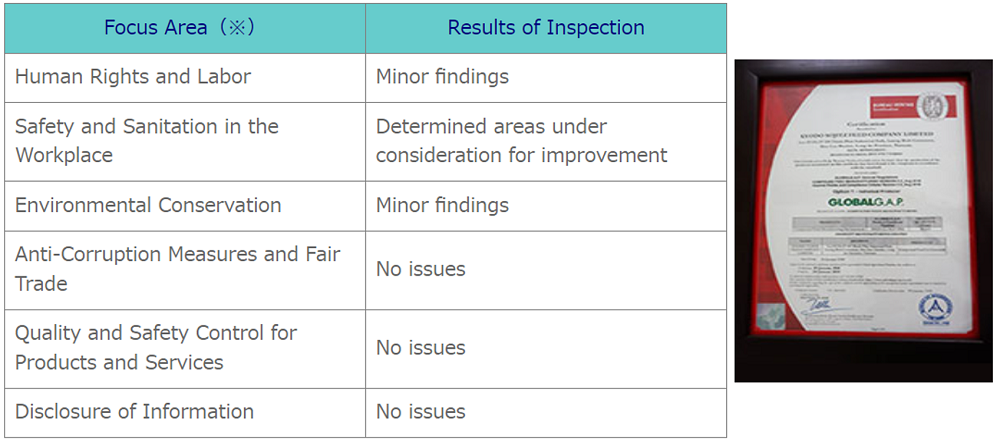
Sojitz Group Practices regarding Foreign Technical Interns
(Basic approach)
We uphold the International Bill of Human Rights and the International Labour Organization’s (ILO) Declaration on Fundamental Principles and Rights at Work, and the company promotes respect for human rights in accordance with the United Nations Guiding Principles on Business and Human Rights.
In Japan, there have been cases in which Foreign Technical Interns face labor and human rights issues, such as low pay, non-payment of wages, lengthy working hours, as well as physical and verbal abuse. The U.S. State Department’s 2023 anti-human trafficking report stated that cases of labor trafficking continue within Japan’s Technical Intern Training Program. As technical interns hail from different nationalities and are linguistically and culturally different to Japanese employees, these workers are often in socially vulnerable positions where they can easily be exploited. Sojitz Group is therefore committed to paying special attention to ensure that technical interns’ rights are protected.
(Initiatives)
In order to ascertain the working conditions of Foreign Technical Interns at Sojitz Group, all Group companies accepting technical interns have been required since 2022 to carry out annual fact-finding surveys to verify that there are no discrepancies between Group practices and relevant labor laws and regulations, while implementing advice from third-party consultants.
Sojitz’s Tokyo HQ also visits Group companies to check technical interns’ workplaces, hold discussions with management and technical interns at Group companies, assess living and working conditions for technical interns, and confirm that technical interns are not struggling with any issues.
In addition to protecting the rights of technical interns, Group companies accepting technical interns also promote seamless communication with technical interns through activities such as providing opportunities for technical interns to study Japanese and holding trips or recreational events.
To increase awareness of Japan’s Technical Intern Training Program at Sojitz, we hold Group-wide information sessions, seminars with external experts on human rights, and open discussions on the topic of accepting technical interns.
Sojitz Group operates with the belief that understanding and implementing appropriate human rights practices at each of its business sites is vital to uphold respect for human rights across our supply chains. Across all Group companies, we consistently hold in-person dialogues with Group company management, provide e-learnings to employees, and host interviews with business divisions and Group companies active in business areas posing high human rights-related risks. Sojitz Group leverages these opportunities to spread Group-wide understanding of society’s most vulnerable populations whose rights require special attention, including foreign residents (technical interns), women, people with disabilities, and Indigenous people. As Japan’s Technical Intern Training Program will be reformed, we will continue to host dialogues and check in with Group companies and verify responses that need to be made in line with the new system.
3-1-3. Seminars on Human Rights Risk
-
Sojitz Group conducts internal seminars on the topic of business and human rights. In 2025, we invited Emi Omura, a lawyer specializing in human rights, to hold a seminar for Sojitz COOs titled "Management Challenges and Solutions Regarding Business and Human Rights." Fifteen COOs from Sojitz business divisions and corporate organizations participated in the seminar.
To begin the seminar, Sojitz President Kosuke Uemura gave opening remarks on the importance of prioritizing human rights in supply chains. Ms. Omura then gave a lecture covering the following topics:
・Types of human rights and human rights risk management
・Key considerations for high-risk business areas
・Human rights issues for supply chain partners and potential impacts on Japanese companies
・Establishment and operation of grievance mechanisms
・Initiatives by other companies and regulatory trends
To ensure understanding and implementation across the entire Group, a video recording of the seminar was made available to Sojitz Group employees. -
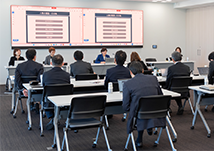
3-1-4. e-Learning
In order to foster understanding of sustainability within Sojitz Group, we regularly conduct e-learning on changes in social trends related to sustainability and the response to environmental and human rights issues required of companies today.
In light of the Australian Modern Slavery Act which was put into law in January 2019 and the UK Modern Slavery Act which was amended in March 2020, we conducted an e-learning at target Australian and European operating companies in FY2020 about the Sojitz Group CSR Action Guidelines for Supply Chains in order to promote understanding and familiarity with local laws and regulations at overseas bases. The CSR Action Guidelines for Supply Chains define Sojitz Group’s approach to environmental and social issues within our supply chains and human rights issues such as modern slavery.
In FY2022, we conducted an e-learning on "Managing Human Rights Risks in Supply Chains" for employees (including seconded employees) at Sojitz Corporation to foster an understanding of the external environment and the Group’s policies and initiatives. In FY2023, we conducted an e-learning with the same content for employees of all Sojitz Group companies, as well as overseas subsidiaries and overseas branches.
Sojitz will continue to conduct e-learnings on addressing environmental and human rights issues for further advance understanding.
3-1-5. Sojitz Group Sustainable Supply Chain Handbook
-
Provided mainly to suppliers, the Sojitz Group Sustainable Supply Chain Handbook shares Sojitz Group's sustainability-oriented policies and goals, and concrete, real examples of risks in business and how these risks were addressed. The handbook was designed specifically to inform suppliers of the importance of cutting greenhouse gas emissions, conserving biodiversity, and other efforts to lessen the environmental impact of business activities. Additionally, it aims to deepen understanding of human rights risks and efforts to improve working environments, as well as encourage readers to make these efforts themselves.
In addition, this handbook requires suppliers to share with Sojitz their activities to reduce negative environmental and human rights impacts and to reduce negative impacts by conducting on-site visits.
-
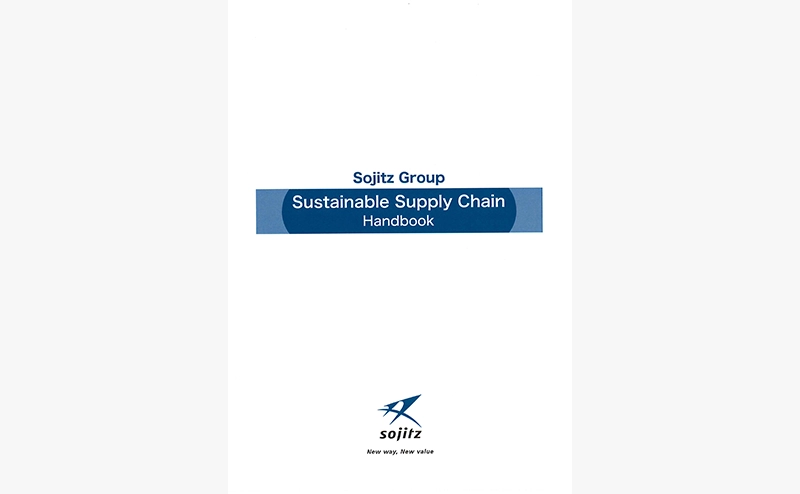
Download [4.97 MB]
3-2. Risk Assessments
3-2-1. New Business Investment and Financing
When conducting new investments and loans, the applying department identifies potential risks such as forced labor, child labor, and impacts on indigenous peoples based on human rights risk issues and response points in each business area, and formulates countermeasures. When necessary, due diligence is conducted to ensure no omissions in the identification of human rights risks or the formulation of countermeasures.

3-2-2. Existing Businesses and the Supply Chain
Identifying Sojitz Group’s High-risk Business Areas
As there are a variety of human rights issues that exist in supply chains, we believe it is important to prioritize our efforts to address human rights issues in business sectors where our analysis has revealed that urgent action is needed. The Business & Human Rights Resource Centre, an NGO based in the United Kingdom, maintains a database with examples of human rights risks. Adopting a risk-based approach, we use this database to identify areas of the Sojitz Group businesses in which risks are particularly high and to analyze and confirm the areas of the supply chain in which human rights risks are generally most likely to appear. High-risk business areas are regularly reviewed based on the latest database, our group's business environment and circumstances, and opinions from external specialists.
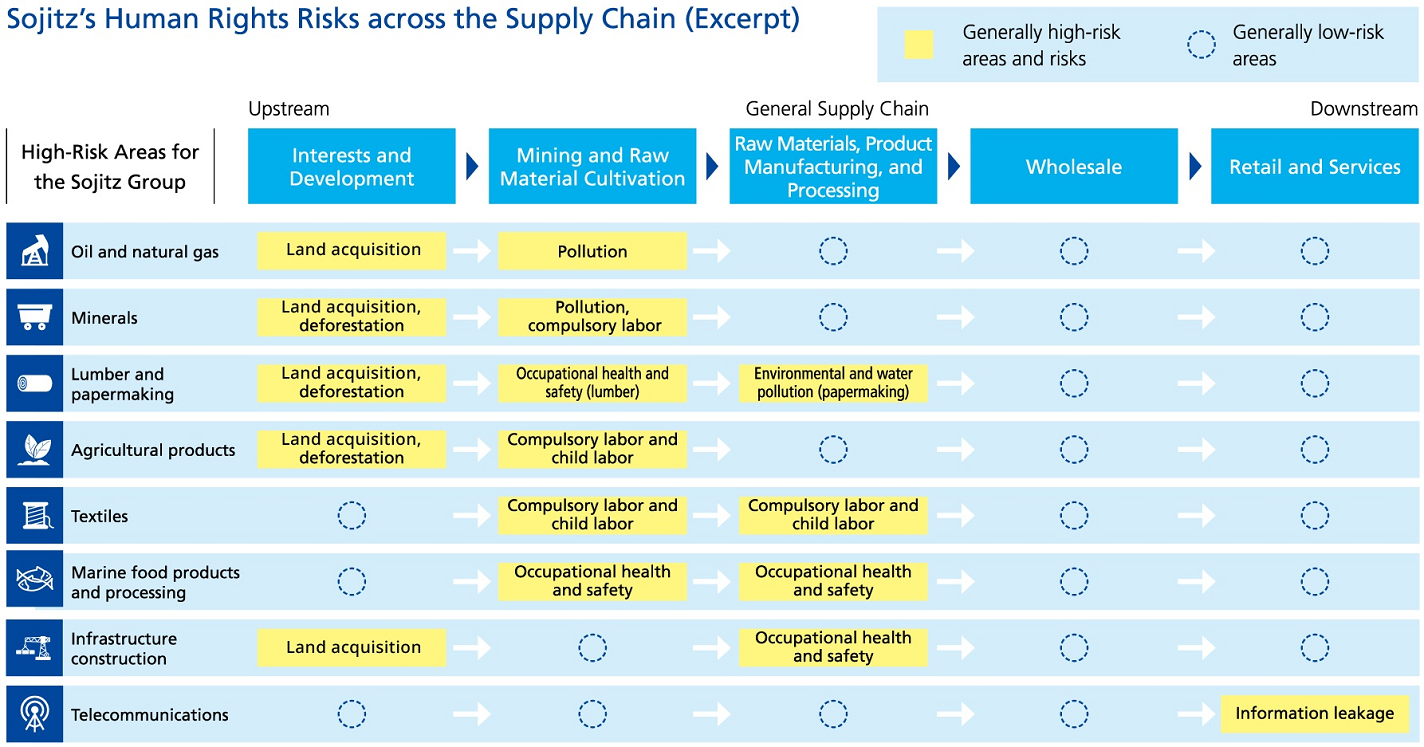
Human Rights Risk Identification and Review
To conduct risk assessments effectively, we identify issues and key points for response in high-risk business areas and share them across the Group. Organizations engaged in high-risk business areas investigate the status of responses by conducting questionnaires, interviews, and site visits with business partners. The results of these investigations are shared with the IR and Corporate Sustainability Department and each organization through annual dialogue, and we have established a system of on-site visits and other methods in case serious issues are identified. We incorporate insights gained from dialogue and interviews, as well as opinions from external specialists, and update issues and key points for response as appropriate.
On-site investigations
Sojitz conducts investigations at the sites of individual transactions and businesses in investigating and confirming human rights risks as required.
For example, regarding the procurement (import) of wood, we have established the Sojitz Wood Procurement Policy based on the three pillars of a legality check, environmental consideration, and social consideration, and we conduct annual surveys to check traceability and environmental and social considerations. As part of the annual surveys, we conduct on-site visits and detailed due diligence involving external specialists for suppliers of concern, as necessary. In FY2024, we conducted four on-site investigations in Indonesia, four in China, three in Malaysia, one in Thailand, and nine in Vietnam.
In addition, we established a procurement policy for marine food products in December 2024, and based on this policy, we began risk assessments in FY2025 and we plan to conduct on-site due diligence starting in FY2026.
3-3. Formulation of Individual Policies
To complement the Sojitz Group CSR Action Guidelines for Supply Chains, Sojitz has formulated policies related to high-risk areas where social standards are being developed, particularly lumber, minerals, palm oil and marine products. Sojitz organizes its policies in regard to these areas, and action is being taken based on the established policies.
Risk Assessment (Wood Procurement)
From among Sojitz Group’s approximately 1,500 wood-related suppliers, we narrowed our scope to wood from countries with high country risk or from suppliers from whom Sojitz Group has purchased the most wood in terms of monetary value. This wood was then checked under the supervision of WWF Japan for 1) whether it could be traced back to its place of origin and 2) suitability of forest management (whether the forest is subject to environmentally/socially-conscious forest management).
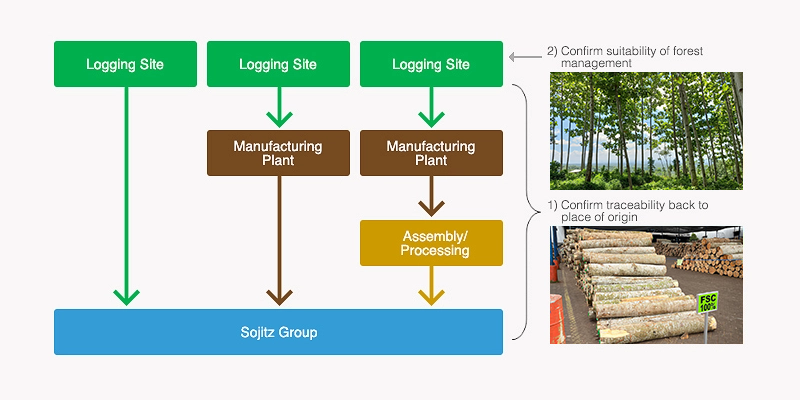
Read more
3-4. Improvements, Remedial Measures, and Disclosure of Results
In FY2024, we continued to conduct risk assessments of high-risk areas and confirmed that there were no significant issues regarding human rights measures at Sojitz Group companies or across the Group’s supply chains. Moving forward, we will continue to pursue ongoing improvements through a PDCA cycle and ensure timely and appropriate disclosures, while incorporating input from external specialists as needed.
Grievance Mechanisms
Sojitz Group has established a system to directly receive information and communications relating to human rights from relevant parties necessary for the improvement and remedy in order to facilitate direct engagement with stakeholders.
■ Contact Information for External Stakeholders (Japanese and English available)
We have established a hotline to receive complaints and inquiries related to human rights from all stakeholders, including those within the supply chain.
After receiving a report, we will confirm and respond through the process outlined below.
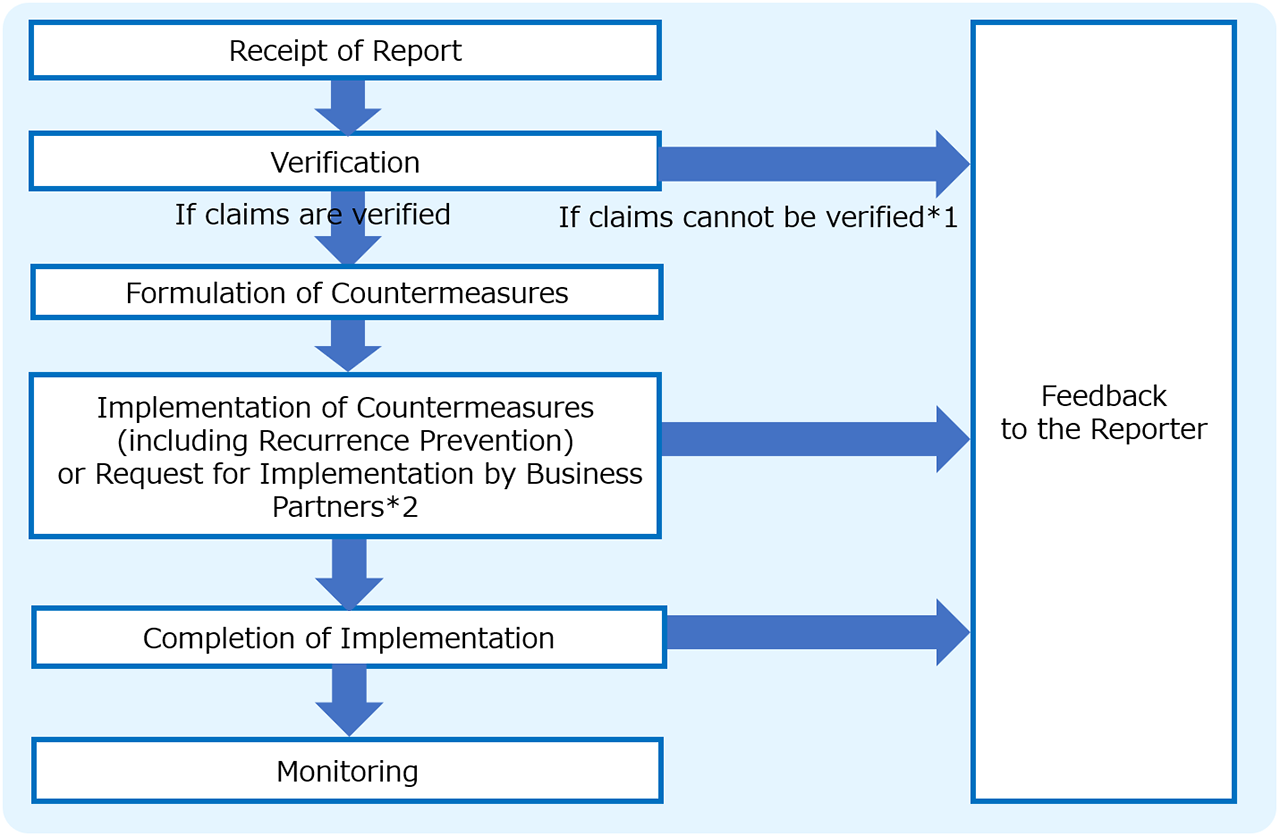
- If claims cannot be verified, we will provide feedback to the reporter and continue the investigation as necessary.
- If no improvement has been made after a specified period by business partners, we will take measures which may include a reconsideration of the contract with the supplier or partner.
■ Internal hotline (25 languages available)
Read more
If a human rights issue related to the Group's business is identified, we will engage in dialogues with stakeholders and take action to address the issue.
We manage personal information provided to our hotlines in accordance with our Privacy Policy to guarantee its confidentiality.
3-5. Other Initiatives
3-5-1. Responsibility to Our Clients
Sojitz’s approach for maintaining food safety and security
Our company was the first general trading company to establish a Quality Assurance Office(*1) within our business division in April 2008 to handle increased consumer concern for food safety and to manage increasing food logistics risks resulting from the acceleration of globalization. We will continue to undertake effective initiatives to maintain the safety and security of food.
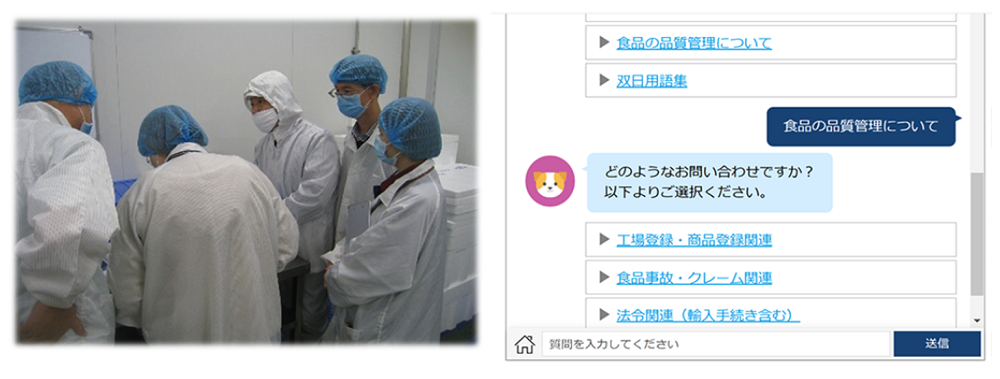
Please refer to the following website for more details.
Read more
4. Performance
4-1. Spreading Awareness of Sojitz’s Human Rights Policy
Sojitz implemented the following measures and awareness-raising initiatives at Sojitz Group companies in its Medium-term Management Plan 2023 (FY2021 through FY2023.)
- Collecting written documents confirming understanding of Sojitz’s human rights policy and relevant issues.
In June 2021, we collected statements from 179 out of 183 consolidated subsidiaries, for a 98% collection rate. - Dialogue with management teams at consolidated subsidiaries.
Sojitz executed dialogues with all 164 consolidated subsidiaries* between April 2021 and June 2022.
Sojitz held dialogues with all 159 consolidated subsidiaries* from August 2023 to March 2024.
(* excluding special purpose companies)
4-2. Identifying Fields of High Public Concern
Every year, we identify fields of high public concern and conduct a comprehensive survey, including our business partners, regarding these issues. In FY2024, we identified and investigated the following issues: a) Respect for human rights in specified regions; b) Foreign Technical Interns.
4-3. Wood Procurement Policy: Results of 2024 Survey
We achieved our FY2025 target (100% Level A+B wood) ahead of schedule in FY2024.
Qualitative Progress and Sojitz’s Target
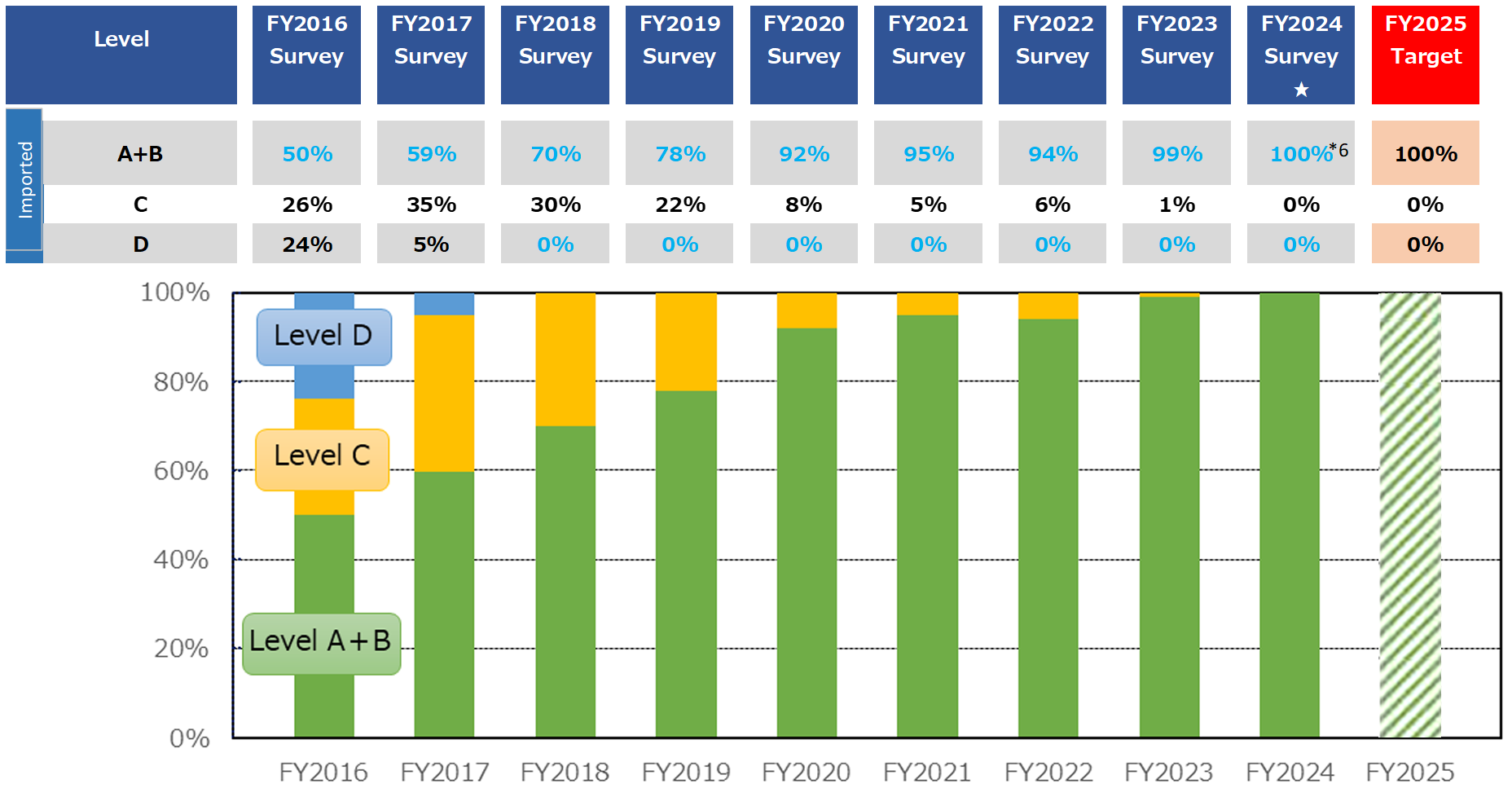
Read more

